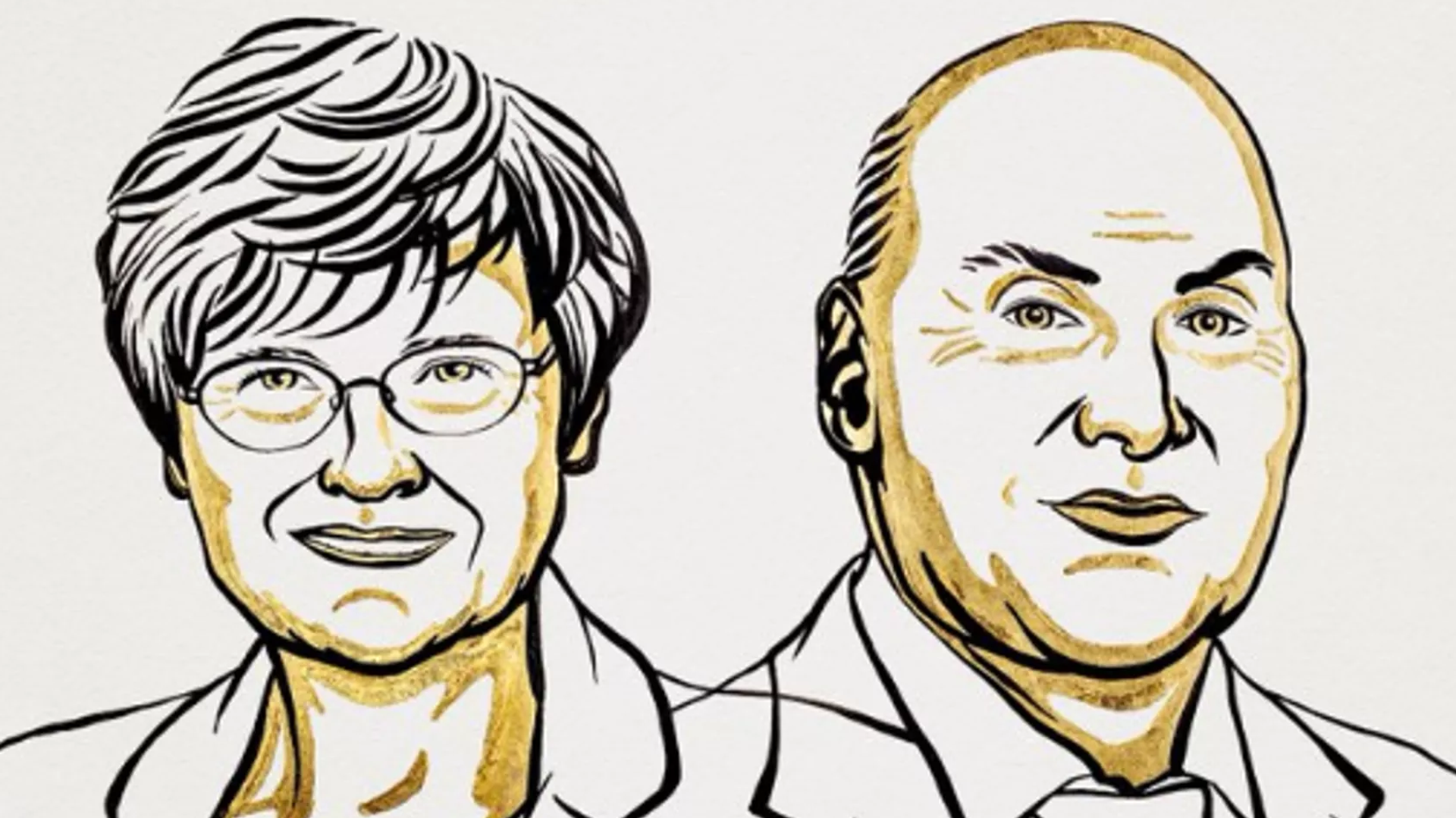https://sputniknews.in/20231002/who-are-nobel-prize-winners-for-medicine-katalin-kariko-and-drew-weissman-4560798.html
Who Are Nobel Prize Winners For Medicine Katalin Kariko and Drew Weissman?
Who Are Nobel Prize Winners For Medicine Katalin Kariko and Drew Weissman?
Sputnik India
Their groundbreaking discoveries revolutionized the comprehension of the interactions between mRNA and the immune system, catalyzing the speedy development of vaccines in the midst of the pandemic," the jury said.
2023-10-02T20:24+0530
2023-10-02T20:24+0530
2023-10-02T20:24+0530
world news
us
hungary
science & tech
health
covid-19 vaccine
covid-19
israel
health crisis
health issues
https://cdn1.img.sputniknews.in/img/07e7/0a/02/4567938_0:4:1677:947_1920x0_80_0_0_2b825685c87e6d340395d90b91b1501a.png
Katalin Kariko of Hungary and Drew Weissman of the United States have been awarded the prestigious 2023 Nobel Prize in Medicine for their groundbreaking discoveries that played a pivotal role in the development of highly effective mRNA vaccines against the COVID-19 pandemic. Who is Katalin Kariko? Nobel laureate Kariko is a Hungarian-American biochemist and researcher who has had an illustrious career as a professor at the esteemed Szeged University and as an adjunct professor at the prestigious Perelman School of Medicine at the University of Pennsylvania.Born in 1955 in the city of Szolnok, Hungary, she earned her bachelor's degree in biology in 1978 and her doctorate in biochemistry in 1982 from Szeged University.Until 1985, Kariko pursued postdoctoral research at the Hungarian Academy of Sciences in Szeged. After moving to the US, Kariko continued her postdoctoral research at Temple University, Philadelphia, and the University of Health Science, Bethesda.In 1989, Kariko was appointed assistant professor at the University of Pennsylvania where she worked for 24 years until 2013.She was later appointed vice president and senior vice president at BioNTech RNA Pharmaceuticals.Who is Drew Weissman?At 64, Weissman holds the esteemed position of Roberts family professor in Vaccine Research and serves as the director of the Penn Institute for RNA Innovations at the University of Pennsylvania.His decades of research into mRNA technology paved the way for COVID-19 vaccines.Born in 1959 in Lexington, Massachusetts, Weissman did his B.A. in Biochemistry and M.A. in Enzymology from Brandeis University in 1981.In 1987, Weissman received his MD in immunology and Ph.D. in microbiology from Boston University.He then did his clinical training at Beth Israel Deaconess Medical Center at Harvard Medical School, and postdoctoral research at the National Institutes of Health.In 1997, Weissman established his research group at the Perelman School of Medicine at the University of Pennsylvania.Weissman and Kariko have been collaborating since 1997, making groundbreaking discoveries that have been instrumental in the development of highly effective mRNA vaccines against the COVID-19 pandemic.
https://sputniknews.in/20230507/remembering-rabindranath-tagore-a-man-of-letters-who-was-also-a-visionary-1847577.html
us
hungary
israel
Sputnik India
feedback.hindi@sputniknews.com
+74956456601
MIA „Rossiya Segodnya“
2023
Sangeeta Yadav
https://cdn1.img.sputniknews.in/img/07e6/0c/0f/110602_0:0:641:640_100x100_80_0_0_c298016a79eb02ef8caa9d1f688c12a5.jpg
Sangeeta Yadav
https://cdn1.img.sputniknews.in/img/07e6/0c/0f/110602_0:0:641:640_100x100_80_0_0_c298016a79eb02ef8caa9d1f688c12a5.jpg
News
en_IN
Sputnik India
feedback.hindi@sputniknews.com
+74956456601
MIA „Rossiya Segodnya“
Sputnik India
feedback.hindi@sputniknews.com
+74956456601
MIA „Rossiya Segodnya“
Sangeeta Yadav
https://cdn1.img.sputniknews.in/img/07e6/0c/0f/110602_0:0:641:640_100x100_80_0_0_c298016a79eb02ef8caa9d1f688c12a5.jpg
know about nobel prize awardee for medicine, katalin kariko, drew weissman, mrna and the immune system, vaccines, covid-19 pandemic, 2023 nobel prize in medicine, mrna vaccines, hungarian-american, biochemist and researcher, professor, szeged university, adjunct professor, perelman school of medicine, university of pennsylvania, biochemistry, postdoctoral research, hungarian academy of sciences, temple university, philadelphia, university of health science, bethesda, assistant professor, biontech rna pharmaceuticals, roberts family professor in vaccine research, director of the penn institute for rna innovations, university of pennsylvania, mrna technology, covid-19 vaccines, lexington, massachusetts, enzymology, brandeis university, immunology, microbiology, boston university, clinical training, beth israel deaconess medical center, harvard medical school, postdoctoral research, national institutes of health, perelman school of medicine,
know about nobel prize awardee for medicine, katalin kariko, drew weissman, mrna and the immune system, vaccines, covid-19 pandemic, 2023 nobel prize in medicine, mrna vaccines, hungarian-american, biochemist and researcher, professor, szeged university, adjunct professor, perelman school of medicine, university of pennsylvania, biochemistry, postdoctoral research, hungarian academy of sciences, temple university, philadelphia, university of health science, bethesda, assistant professor, biontech rna pharmaceuticals, roberts family professor in vaccine research, director of the penn institute for rna innovations, university of pennsylvania, mrna technology, covid-19 vaccines, lexington, massachusetts, enzymology, brandeis university, immunology, microbiology, boston university, clinical training, beth israel deaconess medical center, harvard medical school, postdoctoral research, national institutes of health, perelman school of medicine,
Who Are Nobel Prize Winners For Medicine Katalin Kariko and Drew Weissman?
"Their groundbreaking discoveries revolutionized comprehension of the interactions between mRNA and the immune system, catalyzing the speedy development of vaccines in the midst of the pandemic," the Nobel Prize jury said.
Katalin Kariko of Hungary and Drew Weissman of the United States have been awarded the prestigious 2023 Nobel Prize in Medicine for their groundbreaking discoveries that played a pivotal role in the development of highly effective mRNA vaccines against the COVID-19 pandemic.
Nobel laureate Kariko is a
Hungarian-American biochemist and researcher who has had an illustrious career as a professor at the esteemed Szeged University and as an adjunct professor at the prestigious Perelman School of Medicine at the
University of Pennsylvania.
Born in 1955 in the city of Szolnok, Hungary, she earned her bachelor's degree in biology in 1978 and her doctorate in biochemistry in 1982 from Szeged University.
Until 1985, Kariko pursued postdoctoral research at the Hungarian Academy of Sciences in Szeged.
After moving to the
US, Kariko continued her postdoctoral research at Temple University, Philadelphia, and the University of Health Science, Bethesda.
In 1989, Kariko was appointed assistant professor at the University of Pennsylvania where she worked for 24 years until 2013.
She was later appointed vice president and senior vice president at BioNTech RNA Pharmaceuticals.
At 64, Weissman holds the esteemed position of Roberts family professor in Vaccine Research and serves as the director of the Penn Institute for RNA Innovations at the University of Pennsylvania.
His decades of research into mRNA technology paved the way for COVID-19 vaccines.
Born in 1959 in Lexington, Massachusetts, Weissman did his B.A. in Biochemistry and M.A. in Enzymology from Brandeis University in 1981.
In 1987, Weissman received his MD in immunology and Ph.D. in microbiology from Boston University.
He then did his clinical training at
Beth Israel Deaconess Medical Center at
Harvard Medical School, and postdoctoral research at the
National Institutes of Health.
In 1997, Weissman established his research group at the Perelman School of Medicine at the University of Pennsylvania.
Weissman and Kariko have been collaborating since 1997, making groundbreaking discoveries that have been instrumental in the development of highly effective mRNA vaccines against the COVID-19 pandemic.



